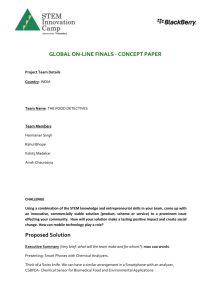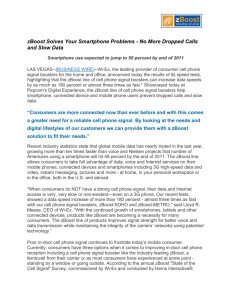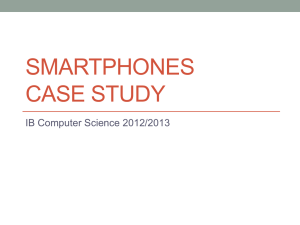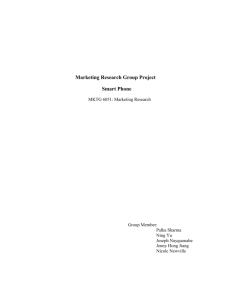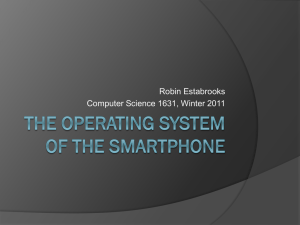Good To Great Ch. 4 “Confront the Brutal Facts” (Yet Never Lose Faith)
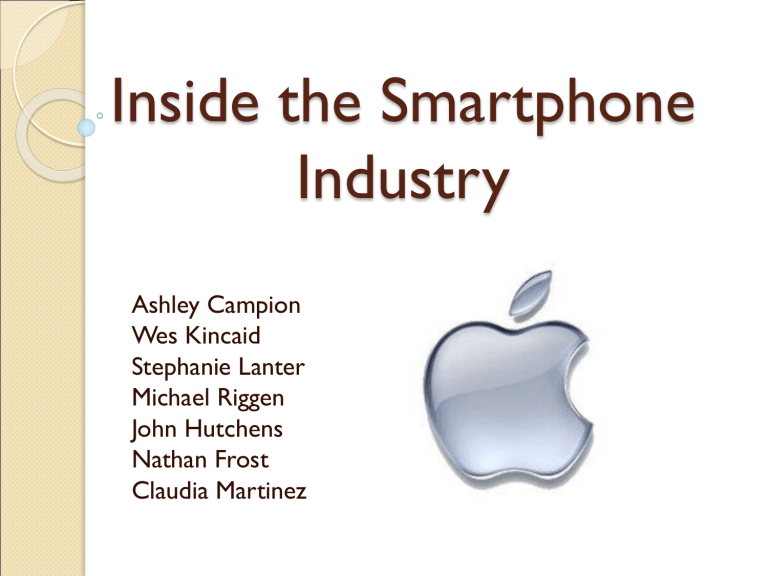
Inside the Smartphone
Industry
Ashley Campion
Wes Kincaid
Stephanie Lanter
Michael Riggen
John Hutchens
Nathan Frost
Claudia Martinez
What is a Smartphone?
A Smartphone is a mobile device offering highly developed features beyond a classic mobile phone
◦ Computer-like functionality
◦ Applications for entertainment
◦ Access to the Web
◦ Personal data processing
The first Smartphone
In 1992, IBM created the first Smartphone which they named “Simon”
◦ Shown as a concept product at COMDEX, a computer industry trade show in Las Vegas
◦ It was released to the public in 1993 and sold by BellSouth
More about Simon…
Other than being a mobile phone it contained such features as a calendar, address book, world clock, calculator, note pad, e-mail, sending and receiving faxes, and games
Customers used a touch-screen to select phone numbers
◦ Text was entered with a unique “predictive” keyboard
• Although it sounds similar to our Smartphone's today, the Simon would be considered fairly lowend
The Industry today
The Smartphone Industry has earned revenues into the billions of dollars and has become extremely competitive
Apple is the leader in the industry today, with a few competitors behind them
◦ Microsoft
◦ Sony
◦ Dell
Market size
Over 168 million customers
◦ Market expanding to teens and even pre teens
◦ Older generations are also acquiring
Smartphones for work purposes
Over 1200 companies
4 major Smartphone providers
◦ Verizon
◦ T-Mobile
◦ AT &T
◦ Sprint
Scope of rivalry
Three contributing factors
◦ 1: Cost of plan
◦ 2: Speed of network
◦ 3: Phones
Life cycle
In the mature stage
Only way to gain an advantage over other companies is by making the three factors better than others.
Problems
Cost of plans
◦ Cancelation fees
◦ Long term contracts
Speed of networks
5 Forces Model
Rivalry within the industry
Main Competitors
- RIM, HTC, Palm, Motorola, Samsung, Nokia
U.S. Market Share of Smartphones
5 Forces Model
Threat of Potential New Entrants
- The threat of new entrants is low since start up costs for a cell phone service provider are extremely high. A great sum of money must be invested to attain the economies of scale, and it is difficult to enter the market with existing firms already operating on cost and differentiation strategies.
First Mover Advantage
- Releasing a product early will enable one to capture the largest market share, establish partnerships, erase barriers to entry, and dim the chances of competition.
Bargaining Power
Buyers
Customers Buying Power
- Phones are changing dramatically and what consumers want is cheap and efficient. Buyers have high bargaining power and will usually pay for what the consumer’s value the most.
Buyers Willingness to Switch
- Will switch for innovative products and good ratings
Suppliers
Suppliers end up being in a low bargaining position because cell phone operators provide such high volume orders that they have to be cautious not to temper with the relationship.
Threat of Substitute Products
Cost and Innovation
- Companies within the industry compete on innovation and new applications.
High switching costs with servers/phones
- Consumers would more than likely not switch between a new product due to contract fees and the cost of purchasing a new product.
Intensity of Rivalry Among Competitors
Innovative (Blue Ocean)
Applications (GPS, Google, Email, Video/Camera, Bluetooth,
Games etc.)
New target market
- Price reduction attract more customers
Establish Mobile Software Giants:
Manufacturers: Google, MSFT
LG, Samsung
Threat of
New Entrants 1. Consumer Market
2. Corporate Market
Bargaining Power
Of Suppliers
1.
Carriers – AT&T
2. OS providers – Linux, WM
3. Hardware makers - Intel
Existing
Rivalry in the Industry
Bargaining Power
Of Buyers
Threat of
Substitute
Products
1.
Skype 2. PDA phone palm
3. Features phones – Nokia, LG
What to learn
Companies need to learn from this what buyer’s value in the industry. How to add value to the customers.
Know what they like and strive to achieve this.
Who are my loyal buyers and suppliers and try to build a strong relationship.
Know what your company is best at and learn how to go from there in making it even better.
Drivers of Change
Long term growth rate
◦ People are taking more of an interest in the
Smartphone
◦ Every quarter more people buy or plan to buy a
Smartphone
Who buys the product
◦ College students
◦ Business professionals
Drivers of Change
Product innovation/technological change
◦ Started as any phone that could text or play games
◦ Now it is any phone with a built in operating system
Internet
GPS
Downloads
Drivers of Change
Diffusion of technological know-how
◦ New generation
◦ Need to upgrade
◦ Need for new technology
Globalization
◦ Strong sales worldwide
◦ Companies on different continents
◦ Constant lines of communication
Drivers of Change
Emerging buyer preferences
◦ Not just for phone calls anymore
◦ High demand for multiple features
Send/receive e-mail
Access to Internet
Purchase I-Tunes, ringtones, and games
Social concerns, attitudes, and lifestyles
◦ Driven by technology
◦ People don’t NEED Smartphones but they WANT them
◦ Keeping up with the Jones’s
Competitive Forces
Global economy
Price
Product Features
Product quality
Design innovation
Strategic Positions
Sony can’t compete
◦ Sales are down
◦ Lack of innovation to compete with Apple
Dell
◦ Cutting operating costs
◦ Just trying to survive economy, not thrive
Strategic Positions
◦ Becoming key player in software development
◦ Numerous “Apps” for iPhone
◦ On top of innovation
Microsoft
◦ Expects double digit revenue increase
◦ Came off of 18% growth in revenue in 2007
◦ Very strong position
Competitive Moves
Microsoft
◦ Look for Microsoft to continue with same results
◦ With double digit growth expected, no reason to let up
◦ Watch for Google to become a key player in software development
◦ Possible product line in the future
Key Success Factors
Technology:
- Internet prediction in
2004
- As consumers increase the demand for more features offer in the service, also, the network capacity
Replacing
Communication
Tools:
Fixed line phones being replaced
Emergence of
Smartphone as a viable tool for many businesses
No real substitute product, therefore, people become dependent on them
Key Success Factors
Next Generation
Experience:
- Companies raising their research to meet consumers needs
-Example: battery runningoff and still having 4hrs of talk time, lighter in weight and thinner
Marketing:
- Quantitative research on mobile phone users reveals that there is currently no such thing as a Smartphone market
- The assumption that the mobile market will develop in the same way as the personal computing market did
Key Success Factors
Pricing:
- About half of the sales of Smartphone are through employers (as opposed to retail channels)
Skill & Capability:
- Manufacturers adding multimedia and other entertainment features to compete
- but segmentation suggest to add communication services like, advanced voice and video e-mail, white-boarding etc.
Key Success Factors
Design & Innovation Expertise:
- Example: Super-smart Smartphone mated into a desktop cradle that hooks up to peripherals like a common all-garden PC. An intelligent dock that would have networking built-in, a USB hub, some sort of communications hook-up, and its own processor, memory, and operating system. It could be connected to an external monitor and keyboard, and would react when a Smartphone was placed into it. The “Smart Interface System for Mobile
Communications Devices”, would work as much as a desktop PC does now.
Industry’s Attractiveness and
Prospects for Long-Term Profitability
Growth Potential
Impact of Competitive Forces
Unattractive Forces in the Smartphone
Industry
Is This an Attractive Industry in Which to
Participate?
Growth Potential
Since 1998, 30% increase in the number of people in United States who own cell phones
◦ Innovation played big part
◦ Progression: (brick phone flip phone
Smartphone)
Average life of a cell phone is only about
18 months
Probably not skyrocketing levels of growth, but still growth potential
Impact of Competitive Forces
Apple
◦ The iPhone’s release put Apple ahead in Smartphone industry (327% growth) the year it came out
Research-in-Motion (BlackBerry)
◦ Frontrunner in Smartphone industry until Apple released the iPhone
HTC
◦ Hopes to pick up speed with new Google phone
Android
Nokia
◦ Known for brick phone
◦ Has Smartphone, but hasn’t seen successful growth in
Smartphone industry
Impact of Competitive Forces
Worldwide: Preliminary Smartphone Sales to End Users by Vendor
Company
3Q08
Sales
3Q08
Market
Share
(%)
3Q07
Sales
3Q07
Market
Share
(%)
3Q08-
3Q07
Growth
(%)
42.4
48.7
Nokia
Research
In
Motion
Apple
HTC
Sharp
15,472
5,80
0
4,720
1,656
1,239
15.9
12.9
4.5
3.4
15,964
3,192
1,104
1,315
1,535
9.7
3.4
4.0
4.7
Others 7,626
20.9
9,643
29.4
Total 36,515
100.0
32,753
Source: http://www.gartner.com/it/page.jsp?id=827912
100.0
-3.1
81.7
327.5
25.9
-19.3
-20.9
11.5
Unattractive Forces in the Smartphone
Industry
“BlackBerry Thumb”
Florida teen sent over 35,000 text message in a month- twice
Texting While Driving
Health hazards
◦ Electronic Magnetic Fields Can Cause Tumors
(preliminary research)
Is This an Attractive Industry in Which to Participate?
Red Ocean
◦ Competing on innovation
◦ Big players like Apple and RIM BlackBerry have huge lead
Blue Ocean
◦ Smartphone companies could differentiate by Dell style customization of cell phones
◦ Or reduce the amount of EMF’s emitted from phone
*Apple’s success in one year could happen with any company

